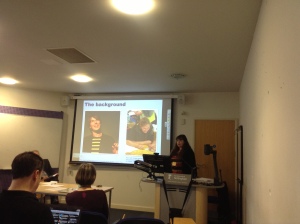Many thanks to everyone who came and took part in the stimulating and wide ranging discussion in room B52 on the experience theme. Despite the room being a very formal lecture theatre we managed to have some interesting exchanges about how we might encourage academic practices amongst our colleagues (I hesitate to use the word open or transparent as I don’t think they reflect the direction the discussion took).
Special thanks to Professor Megan Quentin-Baxter for taking the following (almost) verbatim notes:
Problems and practice and the implications for practice.
I feel a bit like an interloper in the conference discipline – media department archaeology etc. – I don’t come from this world. Whatever this world is.
The questions that are here are about the world of educational development and practice.
Computers will be interesting when they disappear.
OP will be interesting when it disappears.
In accordance with what Pat was saying earlier on then.
I am sort of outside of this comunity as well. Twitter, copyright. We need more education. Not too frightened of it.
There is that kind of education for us and for our students. What should they be doing. What should we be doing.
Staff development and cpd. JIS legal has been doing very good stuff.
SH had been doing stuff like that in Ncl for the last 6 months or so. But you only get the people who know that there is a problem to be solved.
In my experience obstacle s is time. You need tie to take understand things. What it meants to be CC licenced. As authoritative as it comes and with good intentions. I edont have this time
Is it time or fear? Both but time is most important. I am working part time and I am at capacity. If you make it official then people don’t engage you have to make it part of everything else that you do.
Embed it in other activities such as other staff development. Julian I don’t know how you get through to the lone academic who has done it for years. Lots of other people out there. I am at a loss to know how to spread this wide. Nuanced to us. You have to kjnow a lot. Enganced learning, open learning, you have to think differently. They don’t get it and link it over there because they don’t get it.
Anna – open educational practice. Same as when we tired to get people to use computers. Lots of things to learn. You have to make it ubiqiutious.
Sean if they are brilliant at what they do (staff) does it matter computer slide projector, engaging students.
How can students help? Students putting pressure on academics.
Getting students to engage has been important with oer was difficult but I am on Twitter and I tweet OERs to them they are rubbish at using Moodle but they are using resources. They are not very good at demanding – we have to tell them and they are interested but they are not proactive. I talk to students about what my role is at the beginning of the first year so that they know more about me.
Is it a lack of understanding of OERs? It is not the student’s job – students think that they are doing your work for you.
A quality issue if it doesn’t ?
Student will look at stuff again.
With the issues of OER there is a concept there is an empahsis on asking students to create their rown learning pathways. Homogenisation. Competitive environment.
Students are paying a lot of money (England, international). Client relationship. We had the issue recently of providing moducless
Have we managed to embody exciting new pedagogies in oers/moocs?
Spreading open practice – danger that evangelism can lose critical faculty
Where is open? What is open? Less about pedagogy and more about learning
Cant provide models because it would make it too easy for students to complete the assignment. Reluctance because students have travelled that path.
Networking – people. Research
Hang out in the same places. We know this. There is no obvious way of marking ourselves out. Pages that you create on resources. I am an open academy. Some Badges. – Not a lot of ways to identify
Signed up a year ago (OER pledge) a paper and nothing has happened.
We have to go with everything that has happened. Showcase of use of something for a year institution recolonizing by some … no factors need to be
Some kind That is what we have to change for the students to create the context. Pedagogy. Some desire if you took x student and tll them the outcomes that have have to achieve and then the evidence that they have to produce.
If we take away the open, leaving changes in practices. What makes good practice. Better practice. I started out when everything fro the OU was in print. Programmes on the BBC. What happened before it was recorded. Correspondence. Difficult to say that the students viewed that time as better or worse than it is now. Technologies are available and used .
Online conferencing in1988. 2005 before the policy that all courses should have some sort of online presence. How long it takes for change to happen.
The question from me about where the openness is helpful is that people in the OU and across the sector. How do you inculcate the sharing part of practice.
You have to get that activity recognised.
Recognise that type of activity. You have to have a recognition and reward system. MOOCs. Might make us look good. Books as MOOCS but you share books.
Transparency. Always using things in different ways. Very open about what they want to do. The technowizz is not transparent. Transparency with colleagues. Try to sell the benefits of saving time by being transparent. For the students to sell it to them. This looks flashy and weird it might not work. Students might be talking about
Why am I paying for this? Massive transformation – in our old world we had control but we are now in the situation where what we produe might be duplicated 1000 times. You can’t build value systems around.
The opne agenda is getting from that old situation to a new situation. If you tell people that they can only get that info from that place that one place then they will find answers elsewhere. Drop in the ocean. How it makes you think about being in a teaching sigutaiont. Terrible basis for going forward.
MQB noted the look on the face of Vice Chancellors who were lensing forward thinking well if all knowledge is on line then what is the role of the university? One conclusion was that we would have to teach our academics to teach.
Growth in the content agenda. Bookshops libraries. Chalkboards. Taking down the notes and transcribing them. I
There has been more emphasis on the creation of resources rather than the creation of learning experiences.
Using content and rich media. One animation, cost of multiple animations and economies of scale. What is best use of funding. Why redraw something if you can use the original.
Quality of resources, quality of lecturers. Are we prepared to keep paying 100times more for something. Universities .
Changing perceptions of student.
Fragmented practices.
Top down directives are needed.
Early days for us including elearning.
Change of universities.
Not as fast as what goes on around it.
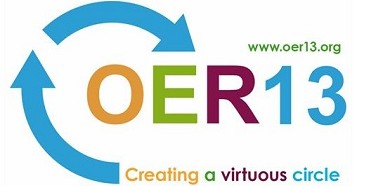
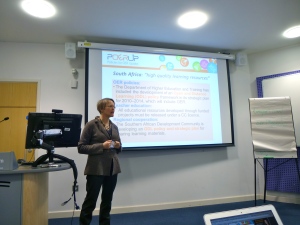
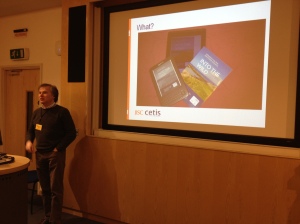
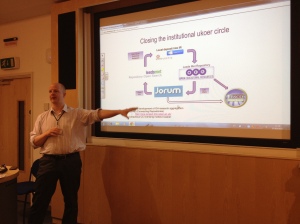
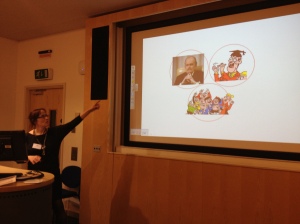
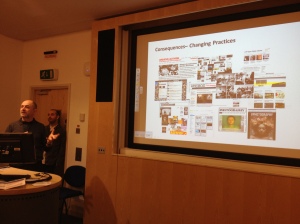
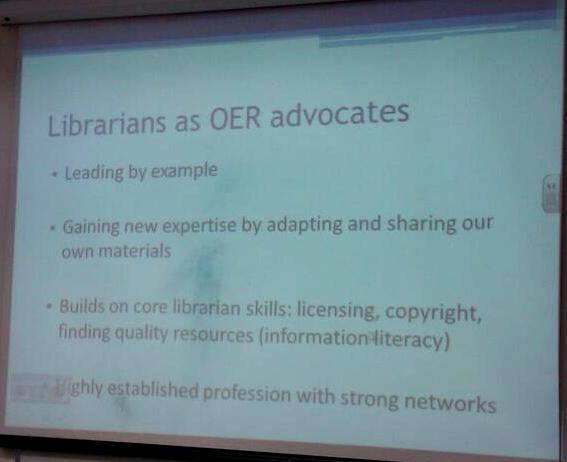
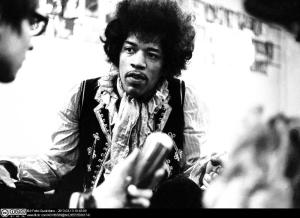
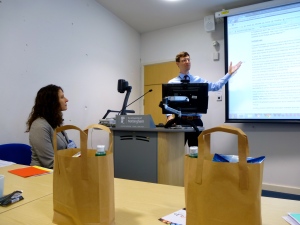
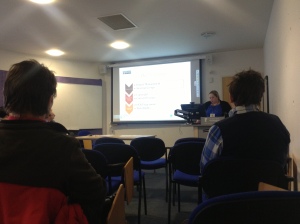
![IMG_1321[1]](https://oer13.files.wordpress.com/2013/03/img_13211.jpg?w=300&h=224)
